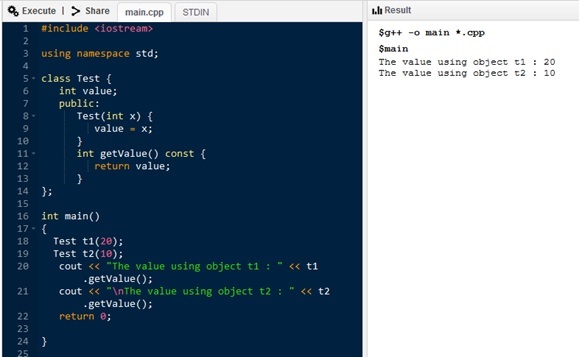The storege elegance of a C++ variableusually determines its “lifetime”, how long it stays withinside the computer’s reminiscence.
C++ software reminiscence layout
The reminiscence of a C++ software jogging on Unix includes the subsequent sections:
Text segment
Static statistics place
Initialized statistics segment
Uninitialized statistics segment
Stack
Free keep
The textual content segment (also known as the code segment) includes the executable commands of this system. The closing sections of reminiscence are used to keep this system’s statistics. Where a usual variable is saved relies upon its garage elegance.
C++ variables basically belong to certainly considered one among 3 garage classes:
Automatic garage: Automatic variables are saved at a stack. Every time a feature is entered, a stack-body is allotted and is normally used to preserve the values of everything computerized variables declared withinside the feature. The stacked body is likewise used to preserve addressing statistics this is used to inform the CPU on how to “go back” to the calling feature. When the feature is exited, the stack-body is deallocated, after that, the variables it contained are destroyed.
In C++, all of the block scope variables (which includes feature parameters) are a computerized garage with the aid of using default.
Static garage: Static variables are saved withinside the static statistics place of the C++ software. Static variables are allotted and initialized earlier than this system begins offevolved jogging and stay in reminiscence so long as this system is jogging, irrespective of even if not or now no longer they’re presently in scope.
Static variables which are initialized explicitly to a price apart from 0 withinside the software’s supply code are saved withinside the initialized statistics segment (also known as. the statistics segment). Static variables which are initialized to 0 or that don’t have specific initialization withinside the software’s supply code are saved withinside the uninitialized statistics segment (normally called the BSS segment, named for an antique assembler pseudo-operation also called the “Block Started with the aid of using Symbol”). They are normally initialized to 0 earlier than this system starts offevolved jogging.
In C++, record scope, the variables are static garage with the aid of using default. A block type scope variable (however now no longer a feature parameter) or a statistics member of a category can be made static garage with the aid of using setting the keyword static found on the front of the variable’s declaration.
For example by programminggeeks , withinside the following feature, the nearby variable num_calls usually has been declared to be static. That way it will likely be initialized to zero earlier than this system starts evolved jogging and could keep its price during the execution of this system.
Without putting thepopular static keyword, the variable num_calls might be computerized storage. As such, it would be created and initialized to zero every time the feature became entered and destroyed while the feature exited.
Dynamic garage: Dynamic variables are saved at the loose store. They are allotted at run time the usage of the C++ operator’s new and new[]. Dynamic variables still exist, they’re explicitly de-allotted the usage of the C++ operators remove and delete[] or this system ends. Managing dynamic garage may be blanketed in element later withinside the semester.
